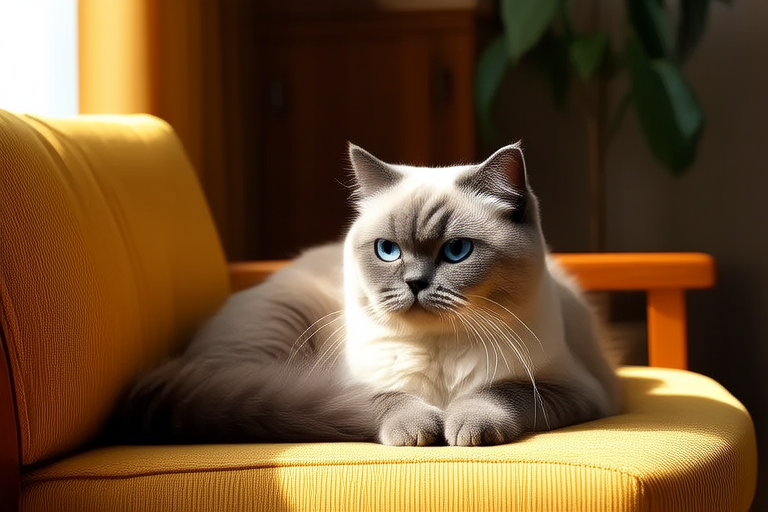Golden Dreams: The Cozy World of British Shorthair Cats
The British Shorthair is a breed of cat that has captured the hearts of many cat enthusiasts around the world. Known for their luxurious golden coats, gentle temperament, and striking appearance, these cats have been cherished companions for centuries. This article delves into the unique characteristics, history, and care requirements of British Shorthairs, offering insights into why they make such wonderful pets.
A Brief History of the British Shorthair
The origins of the British Shorthair can be traced back to ancient Britain, where they were valued for their hunting prowess. Over time, these cats became popular as household pets due to their friendly nature and adaptability. In the late 19th century, British Shorthairs were showcased at cat shows, further cementing their place in the world of feline breeding. Today, they are one of the most recognizable breeds, with their distinctive round faces and plush coats.
The Golden Coat
One of the most striking features of the British Shorthair is its luxurious golden coat. This dense, short fur provides excellent insulation and protection from the elements. The coat’s color can range from a soft cream to a rich gold, with some individuals showcasing unique patterns or markings. The golden hue of their fur gives them a regal appearance, making them stand out in any setting.
Gentle Temperament
Beyond their stunning appearance, British Shorthairs are renowned for their gentle and affectionate nature. These cats are known to be calm and patient, making them ideal companions for families with young children. They are generally tolerant of handling and enjoy spending time with their human companions. Their even-tempered demeanor also makes them compatible with other pets, including dogs and other cats.
Ideal Living Conditions
British Shorthairs thrive in environments that offer comfort and security. They prefer quiet spaces where they can relax and observe their surroundings. While they are adaptable to various living situations, providing them with a cozy bed and scratching post will help them feel at home. It’s important to ensure they have access to clean water and nutritious food, as well as regular veterinary care.
Grooming Needs
Maintaining the health of your British Shorthair’s coat is essential for keeping it looking its best. Regular brushing helps remove loose hair and prevents matting. Bathing should be done sparingly, as these cats are generally self-grooming. Additionally, trimming their nails and cleaning their ears regularly will contribute to their overall well-being.
Common Health Issues
Like all breeds, British Shorthairs may be prone to certain health issues. Responsible breeding practices can help minimize genetic predispositions. Common conditions include obesity, which can lead to joint problems, and respiratory issues, particularly in brachycephalic cats. Regular check-ups with a veterinarian can help catch any potential health concerns early.
Perfect Companions for Families
British Shorthairs are often described as the ideal family pet. Their gentle demeanor and affectionate nature make them great companions for children. They are patient and tolerant, allowing children to handle them without becoming stressed. Additionally, their compatibility with other pets means they can coexist peacefully in multi-pet households.
Facts and Myths
There are several interesting facts and myths surrounding British Shorthairs. One common myth is that they require less attention than other breeds. In reality, while they are independent, they still value interaction with their human companions. Another myth is that they are lazy, but in truth, they are quite active, especially during playtime. A lesser-known fact is that their round faces are a result of selective breeding, which has enhanced their distinctive appearance.
Tips for Potential Owners
If you’re considering adopting a British Shorthair, there are several things to keep in mind. First, choose a reputable breeder who prioritizes the health and well-being of their cats. Once you bring your new companion home, gradually introduce them to their new environment to reduce stress. Provide plenty of toys and activities to keep them mentally stimulated, and establish a routine for feeding and playtime.
Conclusion
The British Shorthair is a breed that offers much more than just a beautiful appearance. With their gentle temperament, luxurious golden coats, and compatibility with families and other pets, they make wonderful companions. By understanding their unique needs and providing proper care, you can ensure a lifetime of joy and companionship with your British Shorthair. Whether you’re a seasoned cat owner or new to the world of feline companions, the British Shorthair is sure to bring warmth and comfort into your home.
